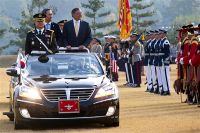SEOUL, South Korea, Oct. 27, 2011 — Defense Secretary Leon E. Panetta assured senior South Korean leaders here today that the United States will continue to provide the military forces and capabilities needed to maintain security on the Korean peninsula.
On the eve of the 43rd annual U.S.-South Korean Security Consultative Meeting, Panetta, along with Army Gen. Martin E. Dempsey, chairman of the Joint Chiefs of Staff, and Army Gen. James D. Thurman, commander of U.S. Forces Korea, gave reporters traveling with the secretary their views on that relationship. Panetta said his discussions with South Korean President Lee Myung-bak, Defense Minister Kim Kwan-jin and Foreign Minister Kim Sung-hwan, all of which Dempsey and Thurman also attended, were productive. The secretary said he assured the South Korean leaders that U.S. troops will remain in South Korea at unreduced levels “as long as it takes to protect the Republic of Korea.”
“We’re committed to strengthening the alliance,” he added, “and we’ll continue to provide the forces and the military capabilities needed to maintain security on the peninsula.”
The United States, Panetta continued, also will ensure the U.S.-South Korean alliance maintains a strong deterrent posture, including the U.S. nuclear umbrella, “so that North Korea never misjudges our will and capacity to respond decisively to aggression.”
North Korea’s pursuit of nuclear weapons and advanced missile capabilities continues to defy the international community, the secretary said.
“Despite the provocations, we have and will continue to reach out diplomatically. In the words of Teddy Roosevelt, we will speak softly but carry a big stick,” he said.
“North Korea can behave, as we all know, in very unpredictable ways,” Panetta said, noting his South Korean counterparts told him today that 200 North Korean citizens are “stuck in Libya” because the regime in Pyongyang believes they would spread to the North Korean people the news of Moammar Gadhafi’s death and Libya’s liberation.
U.S. and North Korean diplomats’ meetings held in Geneva this week produced a narrowing of differences, State Department officials said, but they resulted in no breakthroughs, and significant issues remain.
North Korea’s nuclear ambitions remain a concern, Panetta said. Experience, he noted, indicates that skepticism is appropriate in the face of the North Koreans’ current accommodating posture.
“We always have to be vigilant in the way we approach North Korea, because there is a history here of accommodation and provocation,” the secretary said. “There are periods when we’re hopeful we might be able to achieve some diplomatic progress in eliminating their nuclearization program. Then, for whatever reason, we’re not successful, and suddenly we enter a period of provocation.”
The United States must proceed under the hope that North Korea ultimately will “do the right thing” and take steps to improve the lives of its people, the secretary said. But, he added, the U.S. also must realize that North Korea is likely to keep seeking to increase its nuclear capability.
For that reason, the secretary said, the United States and South Korea must always maintain a strong alliance to demonstrate they will not allow North Korea to threaten the peninsula.
Panetta said it sometimes appears that China is urging North Korea to give up its nuclear program and engage with other nations. Yet, he added, China could be still more helpful in the process.
“Frankly, I think China could do more. … They are in a position where they can influence what can happen in North Korea,” Panetta said. “Sometimes North Korea doesn’t pay attention. The hope is [China] will continue to push North Korea to … do the right things.”
Thurman said U.S. and South Korean forces on the peninsula are well aware of the seriousness of their task. The two militaries form a truly combined force for the alliance, the general said.
“We’ve got a degree of transparency where we’re constantly in consultation,” Thurman said. “Maintaining a high degree of readiness is essential to deterring provocations.”
During today’s meetings, Panetta said, he also thanked the South Korean leaders for their troop contributions in Afghanistan, where their troops are serving “with honor and distinction.”
The meetings also touched on the U.S. government’s desire to see South Korea increase its participation in nonproliferation efforts and interdiction exercises, he said.
Topics also included the bilateral effort to relocate U.S. troops from Yongsan Garrison in Seoul to Camp Humphreys in Pyeongtaek, Panetta said, and the need to work closely to ensure that move is completed on schedule by 2015.
Panetta and Dempsey will take part tomorrow in sessions of the 43rd Security Consultative Meeting. The meeting is an annual conference of U.S. and South Korea government defense delegations.
Source:
U.S. Department of Defense
Office of the Assistant Secretary of Defense (Public Affairs)

 von
von 
